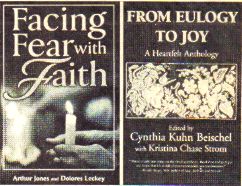
Books on faith help readers face fear and grief |
|
|
FACING FEAR WITH FAITH, by
Arthur Jones and Dolores Leckey. Thomas More Publishing (Alien, Texas, 2002). 160 pp., $12.95. FROM EULOGY TO JOY: A HEARTFELT ANTHOLOGY, edited by Cynthia Kuhn Beischel with Kristina Chase Strom. Capital Books (Sterling, Va., 2002). 544pp., $16.95. REVIEWED BY ELIZABETH RACKOVER What to make of "Facing Fear With Faith," especially when our current fear is created by someone else's version of faith? Even faith gone bad — politicized and distorted beyond God's own recognition — still may be called faith. How can we propose to face fear with our version of faith? It is with such skepticism that I approached this book. And then the big break. Dolores Leckey writes two simple sentences: "I join with those I will never know, but with whom I share God's world, and God's profound sorrow. I pray these lines with them." And these words affect me like no others since that horrible night when, with my daughters pulled close to me, we tried to say a Hail Mary for every soul who had jumped out of those buildings or been plowed under by the diving, building-burrowing jet airplanes. Leckey goes on to say "Faith is where we find the strength to relight the candles the hurricane of terrorism blew out" and that "faith ... has a twin, endurance." Interspersed through Arthur Jones and Leckey's joint prose are poems and prose excerpts, many of which were similarly inspired by those horrific terrorist attacks against America. One of my favorites is a poetic treatment about boarding an airplane shortly after the skies were reopened to passenger airlines: "Today we're going to learn how to bloom in the dead of our winter" (C. Richardson, "Flying in America"). It struck me as funny that the moment I found myself thinking "I love this book" was just when I reached the chapter called "Love." The love that the authors remind us of surrounds us every day. It may not make as much noise as the anger and madness, but it is the precept by which we are called to faith and through which we are to show our faith. Love is at the heart and root of the Christian faith, the Jewish faith and the Muslim faith, all of which claim and answer to the one God. "From Eulogy to Joy" is, true to its title, an anthology on how it feels to be left behind after a death. Personally felt and deeply painful reflections, in a multitude of styles, evolve almost without the reader's knowing it into the requisite (but no less rewarding) affirmation of life. Yes, life is for the living. Yes, there is great pain to be left on this side of a grave. |
 These are the covers to "Facing Fear with Faith," by Arthur Jones and Dolores Leckey, and "From Eulogy to Joy: A Heartfelt Anthology," edited by Cynthia Kuhn Beischel with Kristina Chase Strom. (CNS) As Achilles says in Homer's "The Odyssey," "I would rather be a paid servant in a poor man's house — and be above ground — than king of kings among the dead." We are here, and we have suffered loss: How we feel about that fact, and what we do about it, is subject to emotional ebb and flow and changes from moment to moment. The ebb and flow are mapped in this anthology, whose brilliance lies in its variety of voices. This is no proliferation of sickly sweet, "God-has-a-plan" sermons. Overall, the writing is refreshingly unslick. There is also a fascinating set of essays, written by the daughter of one of the editors, which anchors the progression toward joy. It is painful to follow, but the story of how the wonderful first morning of a beach vacation turned into a nightmare of loss, recrimination, sorrow and discovery ought, at the very least, to inspire the reader to run out and kiss every living family member, every friend and foe with gratitude for the grace of being alive. This book gives voice to every imaginable category of loss, and whether you read it while steeped in grief or years after the funeral, there are riches within. The editors don't try to tell you how to grieve, survive, or recover; they know better. They have simply put together a variety of selections which say, "I understand. It's OK. to feel the way you do." |
Return To Scrapbook Index | Return To Main